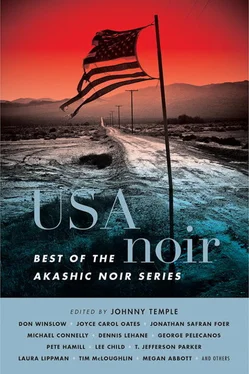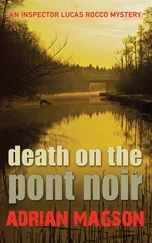Johnny Temple - USA Noir - Best of the Akashic Noir Series
Здесь есть возможность читать онлайн «Johnny Temple - USA Noir - Best of the Akashic Noir Series» весь текст электронной книги совершенно бесплатно (целиком полную версию без сокращений). В некоторых случаях можно слушать аудио, скачать через торрент в формате fb2 и присутствует краткое содержание. Город: New York, Год выпуска: 2013, ISBN: 2013, Издательство: Akashic Books, Жанр: Триллер, Детектив, на английском языке. Описание произведения, (предисловие) а так же отзывы посетителей доступны на портале библиотеки ЛибКат.
- Название:USA Noir: Best of the Akashic Noir Series
- Автор:
- Издательство:Akashic Books
- Жанр:
- Год:2013
- Город:New York
- ISBN:978-1-61775-189-9
- Рейтинг книги:3 / 5. Голосов: 1
-
Избранное:Добавить в избранное
- Отзывы:
-
Ваша оценка:
- 60
- 1
- 2
- 3
- 4
- 5
USA Noir: Best of the Akashic Noir Series: краткое содержание, описание и аннотация
Предлагаем к чтению аннотацию, описание, краткое содержание или предисловие (зависит от того, что написал сам автор книги «USA Noir: Best of the Akashic Noir Series»). Если вы не нашли необходимую информацию о книге — напишите в комментариях, мы постараемся отыскать её.
USA Noir: Best of the Akashic Noir Series — читать онлайн бесплатно полную книгу (весь текст) целиком
Ниже представлен текст книги, разбитый по страницам. Система сохранения места последней прочитанной страницы, позволяет с удобством читать онлайн бесплатно книгу «USA Noir: Best of the Akashic Noir Series», без необходимости каждый раз заново искать на чём Вы остановились. Поставьте закладку, и сможете в любой момент перейти на страницу, на которой закончили чтение.
Интервал:
Закладка:
Star didn’t speak a word when she answered. “Hey,” I said after a few seconds. I said it just as I’d said it to my mother when we came home from my grandmother’s funeral. Sort of like it was a question. Softly. Slowly. It embarrassed me the same way when I said it then. “Hey.”
WHITE TRASH
by Jerome Charyn
Prudence had escaped from the women’s farm in Milledgeville and gone on a crime spree. She murdered six men and a woman, robbed nine McDonald’s and seven Home Depots in different states. She wore a neckerchief gathered under her eyes and carried a silver Colt that was more like an heirloom than a good, reliable gun. The Colt had exploded in her face during one of the robberies at McDonald’s, but she still managed to collect the cash, and her own willfulness wouldn’t allow her to get a new gun.
She wasn’t willful about one thing: she never used a partner, male or female. Women were more reliable than men; they wouldn’t steal your money and expect you to perform sexual feats with their friends. But women thieves could be just as annoying. She’d had her fill of them at the farm, where they read her diary and borrowed her books. Pru didn’t appreciate big fat fingers touching her personal library. Readers were like pilgrims who had to go on their own pilgrimage. Pru was a pilgrim, or at least that’s what she imagined. She read from morning to night whenever she wasn’t out foraging for hard cash. One of her foster mothers had been a relentless reader, and Prudence had gone right through her shelves, book after book: biographies, Bibles, novels, a book on building terrariums, a history of photography, a history of dance, and Leonard Maltin’s Movie Guide, which she liked the best, because she could read the little encapsulated portraits of films without having to bother about the films themselves. But she lost her library when she broke out of jail, and it bothered her to live without books.
The cops had caught on to her tactics, and her picture was nailed to the wall inside post offices, supermarkets, and convenience stores; she might have been trapped in a Home Depot outside Savannah if she hadn’t noticed a state trooper fidgeting with his hat while he stared at her face on the wall.
Pru had to disappear or she wouldn’t survive her next excursion to Home Depot or McDonald’s. And no book could help her now. Travel guides couldn’t map out some no-man’s land where she might be safe. But Emma Mae, her cellmate at Milledgeville, had told her about the Bronx, a place where the cops never patrolled McDonald’s. Besides, she hadn’t murdered a single soul within five hundred miles of Manhattan or the Bronx. Pru wasn’t a mad dog, as the bulletins labeled her. She had to shoot the night manager at McDonald’s, because that would paralyze the customers and discourage anyone from coming after her.
She got on a Greyhound wearing eyeglasses and a man’s lumber jacket after cutting her hair in the mirror of a public toilet. She’d been on the run for two months. Crime wasn’t much of a business. Murdering people, and she still had to live from hand to mouth.
She couldn’t remember how she landed in the Bronx. She walked up the stairs of a subway station, saw a synagogue that had been transformed into a Pentecostal church, then a building with a mural on its back wall picturing a paradise with crocodiles, palm trees, and a little girl. The Bronx was filled with Latinas and burly black men, Emma Mae had told her; the only whites who lived there were “trash”—outcasts and country people who had to relocate. Pru could hide among them, practically invisible in a casbah that no one cared about.
Emma Mae had given her an address, a street called Marcy Place, where the cousin of a cousin lived, a preacher who played the tambourine and bilked white trash, like Prudence and Emma. He was right at the door when Pru arrived, an anemic-looking man dressed in black, with a skunk’s white streak in his hair, though he didn’t have a skunk’s eyes; his were clear as pale green crystals and burned right into Pru. She was hypnotized without his having to say a single syllable. He laughed at her disguise, and that laughter seemed to break the spell.
“Prudence Miller,” he said, “are you a man or a girl?”
His voice was reedy, much less potent than his eyes.
Emma Mae must have told him about her pilgrimage to the Bronx. But Pru still didn’t understand what it meant to be the cousin of a cousin. His name was Omar Kaplan. It must have been the alias of an alias, since Omar couldn’t be a Christian name. She’d heard all about Omar Khayyam, the Persian philosopher and poet who was responsible for the Rubaiyat, the longest love poem in history, though she hadn’t read a line. And this Omar must have been a philosopher as well as a fraud—his apartment, which faced a brick wall, was lined with books. He had all the old Modern Library classics, like Anna Karenina and The Brothers Karamazov, books that Pru had discovered in secondhand shops in towns that had a college campus.
“You’ll stay away from McDonald’s,” he said in that reedy voice of his, “and you’d better not have a gun.”
“Then how will I earn my keep, Mr. Omar Kaplan? I’m down to my last dollar.”
“Consider this a religious retreat, or a rest cure, but no guns. I’ll stake you to whatever you need.”
Pru laughed bitterly, but kept that laugh locked inside her throat. Omar Kaplan intended to turn her into a slave, to write his own Rubaiyat on the softest parts of her flesh. She waited for him to pounce. He didn’t touch her or steal her gun. She slept with the silver Colt under her pillow, on a cot near the kitchen, while Omar had the bedroom all to himself. It was dark as a cave. He’d emerge from the bedroom, dressed in black, like some Satan with piercing green eyes, prepared to soft-soap whatever white trash had wandered into the Bronx. He’d leave the apartment at seven in the morning and wouldn’t return before nine at night. But there was always food in the fridge, fancier food than she’d ever had: salmon cutlets, Belgian beer, artichokes, strawberries from Israel, a small wheel of Swiss cheese with blue numbers stamped on the rind.
He was much more talkative after he returned from one of his pilferings. He’d switch off all the lamps and light a candle, and they’d have salmon cutlets together, drink Belgian beer. He’d rattle his tambourine from time to time, sing Christian songs. It could have been the dark beer that greased his tongue.
“Prudence, did you ever feel any remorse after killing those night managers?”
“None that I know of,” she said.
“Their faces don’t come back to haunt you in your dreams?”
“I never dream,” she said.
“Do you ever consider all the orphans and widows you made?”
“I’m an orphan,” she said, “and maybe I just widened the franchise.”
“Pru the orphan-maker.”
“Something like that,” she said.
“Would you light a candle with me for their lost souls?”
She didn’t care. She lit the candle, while Satan crinkled his eyes and mumbled something. Then he marched into his bedroom and closed the door. It galled her. She’d have felt more comfortable if he’d tried to undress her. She might have slept with Satan, left marks on his neck.
She would take long walks in the Bronx, with her silver gun. She sought replicas of herself, wanderers with pink skin. But she found Latinas with baby carriages, old black women outside a beauty parlor, black and Latino men on a basketball court. She wasn’t going to wear a neckerchief mask and rob men and boys playing ball.
Читать дальшеИнтервал:
Закладка:
Похожие книги на «USA Noir: Best of the Akashic Noir Series»
Представляем Вашему вниманию похожие книги на «USA Noir: Best of the Akashic Noir Series» списком для выбора. Мы отобрали схожую по названию и смыслу литературу в надежде предоставить читателям больше вариантов отыскать новые, интересные, ещё непрочитанные произведения.
Обсуждение, отзывы о книге «USA Noir: Best of the Akashic Noir Series» и просто собственные мнения читателей. Оставьте ваши комментарии, напишите, что Вы думаете о произведении, его смысле или главных героях. Укажите что конкретно понравилось, а что нет, и почему Вы так считаете.












